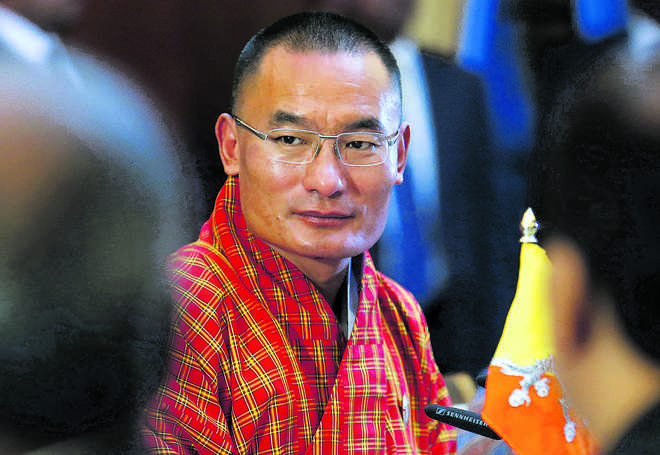
challenger: The Bhutanese PM, Tshering Tobgay. China wants diplomatic ties with Bhutan.
Sandeep Dikshit
THE Indian Army has stalled PLA's “creeping incursion”, a favoured expression among Sino-Indian border experts to describe every dust-up on the Sino-Indian border on the trijunction with Bhutan and China.
Even the discerning among them view border disagreements through the security lens: tactical (construction of bunkers, simultaneous arrival of patrols etc.) and strategic (occupy a vantage point or signal disapproval for a military adventure elsewhere). The latest face-off does counter the PLA's attempt to construct a dirt road near the India-Bhutan-China trijunction. It may even lead to, as experts fear, a support infrastructure that can bear the movement of heavy weaponry to threaten Indian positions and infrastructure.
But the latest bad blood between the two neighbours may also be part of China's attempt to attend to its Achilles Heel— a complete absence of diplomatic ties with Bhutan. This may well have been the stick that succeeded the carrot of a UN Security Council seat that Bhutan had earlier spurned. The last general elections in Bhutan were an opportunity for China to restore diplomatic ties with Bhutan. While the first elections in 2008 did not have the competitive edge that sends rivals searching for suitable backers, China detected an opening in the 2013 elections. It offered the then Prime Minister a seat on the global high table for Bhutan, in return for early establishment of diplomatic relations. In case the message was lost, it was again spelt out by a visiting Chinese Minister, a rare occurrence, in Thimphu. The Indian response to Bhutan hiding its parleys with China was a mirror image of its later blockade of Nepal. While elections were hotting up, India withdrew the subsidy on cooking gas and kerosene sending the prices skyrocketing. The resulting hardship helped challenger Tshering Tobgay score an upset win over the incumbent who had crossed India's red line of discussing restoration of diplomatic relations with the Chinese leadership. Elections are now due next year in Bhutan and the political field is crowding up. Pro-Indian parties, currently the entire spectrum, will be forced to shore up their legitimacy among voters with credible offers of better facilities to its remote areas. This was an offer by the Chinese that Nepal found hard to resist. South Block may seek to counter a similar Chinese offer to Bhutan by roping in Japan, a purse-rich fellow traveller. The first stone may have been cast when Princess Mako of Japan visited Bhutan last month. The Japanese royalty does not make casual visits. The Emperor visited India after a big gap of 50 years in 2013 to flag an irreversible upturn in Indo-Japan ties. The Japanese diplomatic corps from Delhi shifted to Thimphu to facilitate Princess Mako's visit. It is reasonable to assume they would have availed the opportunity for parleys with Bhutanese counterparts. But India cannot rest easy on a future Indo-Japanese initiative to neutralise China's temptations for infrastructure development. Its plans for achieving energy security ride on hydel projects in Bhutan. If the blueprint translates into reality, power flowing from Bhutan will be four times more than all civil nuclear projects together. Indian payments for electricity make up more than half of Bhutan's total income. Till now it was a win-win arrangement for both sides. Unabated development has its downside. The bazaars of Paro and Phuentsholing are abuzz with the latest CAG report alleging corruption in a showpiece hydel project. This is adding to talk about the discomforts of displacement from land-guzzling hydel projects. Prime Minister Narendra Modi also suffered a personal setback when his pet project for seamless travel among SAARC countries was turned down by the Bhutanese upper house. Issues such as displacement used to be the domain of permanently disgruntled exiles like the late Rongthong Kunley Dorji. Now these are being aired by political parties.
In the chaos that democracy stirs up, Bhutanese are bound to weigh costs of a permanent security entanglement at the border with China vis-a-vis normal diplomatic relations. China may even tempt Bhutan with precedents of its generosity in settling land disputes with Kazakhstan and Tajikistan. Bhutan's steadfast refusal for diplomatic ties with China is an anachronism in today's world, especially when India under Prime Minister Narendra Modi is in the forefront of striking alliances with mutual adversaries such as Saudi Arabia and Iran; Israel and Kuwait; Azerbaijan and Armenia and; Poland and Russia. Even if the road sought to be built by China has only military significance and nothing else, neither India nor Bhutan can ignore the overhand of thwarted Chinese ambitions on the foreign policy level.
The bad vibes flowing from this confrontation are bound to further vitiate Bhutanese perceptions about China. A sizeable contingent of Tibetans in Bhutan already keeps anti-China sentiments on the boil, while older Bhutanese have memories of waves of devastated and emaciated Tibetans passing through their land on to India after the PLA began its crackdown in Tibet in 1959. Restoration of diplomatic relations will hardly change the image of the Hans having maltreated their compatriot Buddhists of Tibet.
The reaction from Beijing after Indian soldiers took up cudgels with the PLA on behalf of the Bhutanese army was that of a scalded cat. This may be giving away its frustration at the stalling of a larger game. The spirited Indian Army intervention (after the Indian government reportedly did not act on a Chinese intimation to construct the road) ensured that the messaging did not remain a China-Bhutan affair as Beijing had originally intended. India needs to shore up its act in the Kingdom — from probity in mega developmental projects to even handed treatment of all political parties —to keep the status quo unchanged.



























